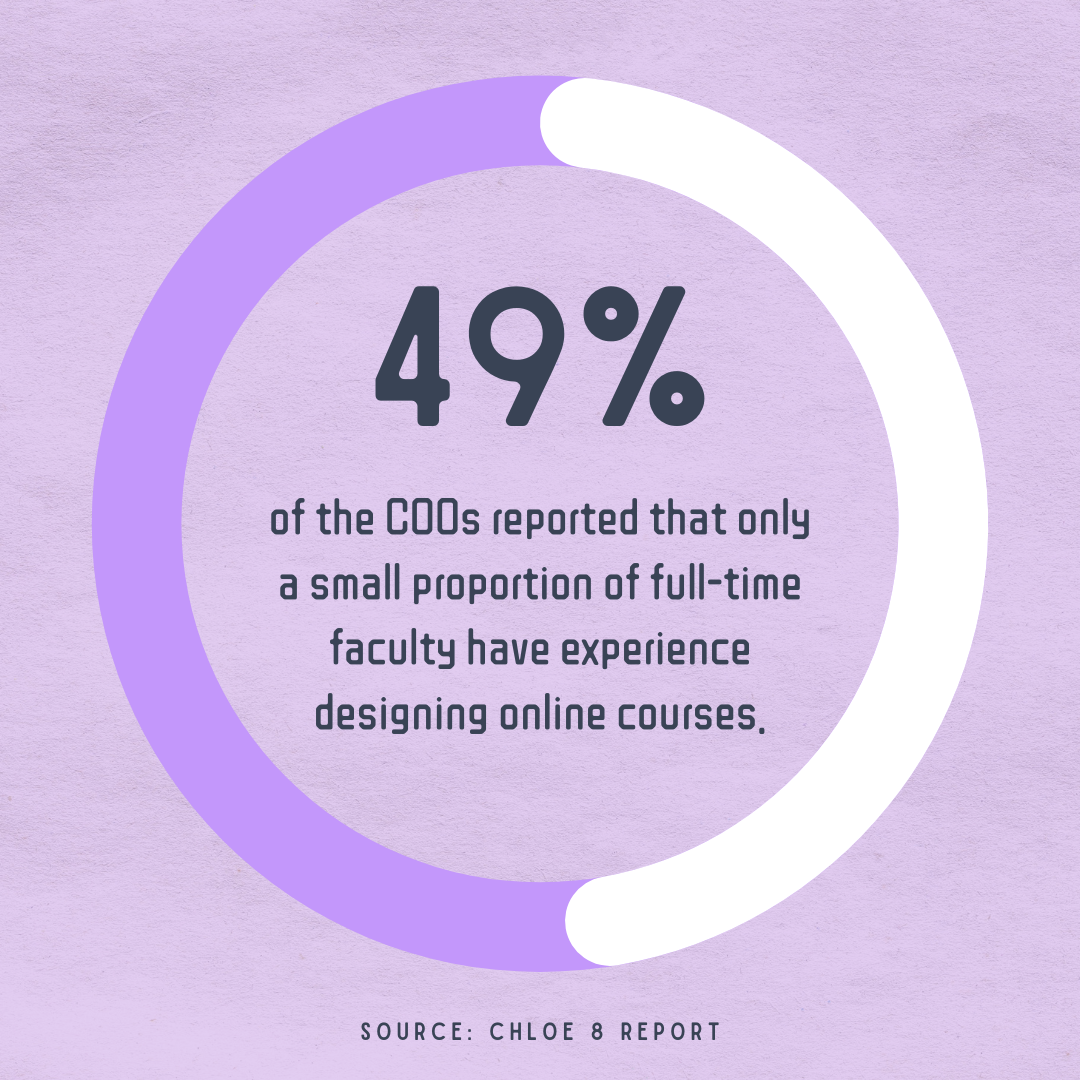49% of the COOs surveyed in the 2023 CHLOE 8 report indicated only a small proportion of full-time faculty have experience designing online courses. Yet, more students demand online learning options, and more schools say they are investing in online. 
Educators must adapt teaching methods to effectively engage students online. They need training to transition from more traditional modes of teaching to online. That means schools need to invest in faculty training and professional development. A comprehensive training program that equips faculty with the skills and tools to create exceptional online courses is imperative to achieve this.
Moving Courses Online
Online education has transformed from an alternative option to a mainstream mode of learning. It offers flexibility, accessibility, and convenience that cater to a diverse array of students. As institutions strive to provide high-quality online education, faculty members play a pivotal role in shaping the learning experience. However, creating effective online courses requires a unique skill set combining pedagogical expertise and technological proficiency.
The quick switch to online in 2020 was emergency learning. Online courses were a patch for many institutions, faculty, and students. Now is the time to transform those emergency patched-together courses with informed instructional design and engaging learning experiences.
Why Faculty Training in Online Course Design Matters
The latest CHLOE 8 report sheds light on the current state of online learning in higher education. The report emphasizes the following key points:
Faculty Training is Inadequate: Despite the widespread growth of online courses, the report highlights that a significant percentage of faculty members feel they need to be more prepared to teach in the online environment.
Limited Experience: A substantial number of faculty members need more experience with online teaching, especially when designing engaging and effective courses.
Quality Matters: The quality of online courses significantly impacts student engagement, retention, and learning outcomes. Training in best practices is essential to ensure that courses are designed to meet these quality benchmarks.
Stay on trend with The Babb Group’s monthly newsletter.
Benefits of Faculty Training
Considering the findings of the report, there is a pressing need for faculty training in online course design. Here are some of the benefits of training faculty.
Enhanced Student Engagement: Faculty members equipped with online course design skills can create interactive and engaging courses that captivate students’ attention and encourage active participation.
Improved Learning Outcomes: Effective course design that aligns with pedagogical principles can improve student learning outcomes, ensuring students grasp and retain course material.
Student Retention: Engaging online courses contribute to higher student satisfaction and retention rates, a crucial factor for the success of any educational institution.
Competitive Advantage: Institutions that invest in faculty training for online course design gain a competitive edge by offering high-quality online programs that attract students seeking excellence in their online learning experiences.
As higher education evolves to embrace online learning, faculty members must equip themselves with the necessary skills to create impactful online courses. The CHLOE 8 report underscores the importance of faculty training in online course design, emphasizing the current gaps. By investing in comprehensive training programs, institutions empower their faculty and ensure the delivery of high-quality online education that meets the needs of today’s diverse group of digital learners.
Ready to invest in your faculty and boost retention? Talk to The Babb Group today about creating a customized faculty training program.
Angela Britcher
Latest posts by Angela Britcher (see all)
- Enhancing First-Year Experiences in Higher Education - August 1, 2024
- Enhancing Education with Virtual Reality: A Hands-On Approach - June 27, 2024
- Higher Education Trends: Insights from Our COO, Sheila Fry - June 13, 2024